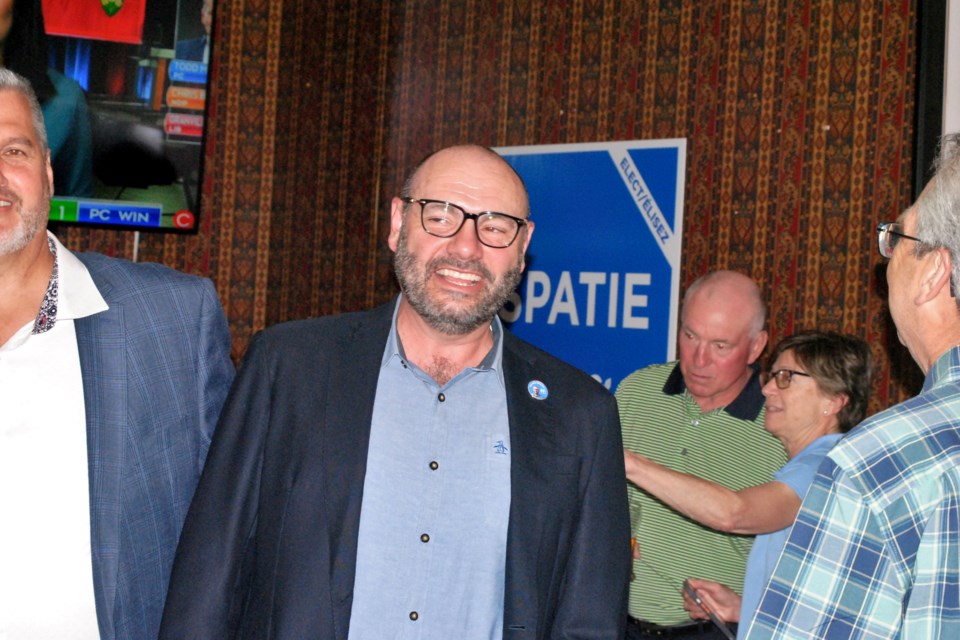Although they fell short of winning their respective campaigns, Greater Sudbury’s Progressive Conservative candidates appear to have made gains on election night.
This, despite employing a campaign style in which they consistently evaded media and debate.
The key, Nickel Belt Progressive Conservative candidate Randy Hazlett said, was getting out and meeting constituents face-to-face.
He estimates to have knocked on almost 10,000 doors since November.
“I think that made the difference, just getting out to hear the constituents one on one and hear their concerns and hear what they need here in Nickel Belt, that’s what made the difference.”
Gathered alongside supporters at Cousin Vinny’s Restaurant and Bar in Hanmer, he credited a core group of approximately seven people, bolstered by additional volunteers in the campaign’s final weeks, with helping get their messages out.
Celebrating with his team at Eddie’s Restaurant tonight, Sudbury Progressive Conservative candidate Marc Despatie told Sudbury.com that while he was both disappointed and surprised by the local results, he was at least grateful that Progresive Conservative Premier Doug Ford would remain on board with a majority government.
“Sudbury decided to continue in the same course as it has been, and that’s one of the beauties of democracy,” he said.
“Our message resonated throughout the province. This message of hope, of wanting to build, and that’s good news, even for Sudbury, that we’re there. … We have what I think is going to be the most solid government for us for the next four years.”
The Tories maintaining a majority wasn’t surprising to Despatie given the events of the COVID-19 pandemic.
“I don’t feel that this was a change election,” he said. “I think that people thought, we’ve probably been through the most major upheaval in our lives over the last two and a half years and we don’t want to change things anymore – we’ve done OK.”
Despatie estimates to have knocked on more than 6,000 doors during his campaign.
The local Tories hosted unique campaigns this election cycle, during which neither candidate participated in any of the debates hosted locally, including those hosted by the Greater Sudbury Chamber of Commerce, the Canadian Association of Retired Persons and the Sudbury and District Labour Council.
Although Progressive Conservative party headquarters sent Sudbury.com a couple of one-line responses to certain inquiries, interview requests were ignored throughout the election season.
Sudbury.com had reached out for insight from local candidates on various issues, with the most notable including the Ontario Autism Program, whose waitlist has doubled under Ford despite prior assurance it would be cleared, and the privatization of health-care services.
Although local Green, NDP and Liberal candidates pledged financial support for the city’s supervised consumption site and transitional housing complex, if elected, neither Hazlett nor Despatie responded to Sudbury.com’s inquiry for their take on the ongoing municipal request.
The local Tories were also notably absent from a recent #saveLUgreenspace pledge that stated, “If elected, I pledge to actively support the protection of the LU greenspace in its natural state, as a freely accessible community greenspace.”
“It was a decision that was kind of made between myself and the internal party,” Hazlett said of their approach to avoid media and debates, adding that he fully recognizes that this broke from tradition.
Skipping the debates, he said that he knocked on 75 doors those nights.
“That’s 75 more homes I could talk to directly, that got a better opinion of me than they could have gotten from me on that stage, I felt.”
After clarifying that he didn’t want to get into campaign strategy, Despatie said, “You’ll see that this was not unique to Nickel Belt, it was not unique to Sudbury.”
“Observers of politics think that there is one way to run a campaign,” he added. “There’s actually a lot of ways to run a campaign. I believe that we would describe this as a frontrunner strategy. Don’t rock the boat, what you’re doing is working, and so try and deliver that message.”
Although the full results for Sudbury were not yet in when this story was written, the local Tories’ non-traditional campaigns didn’t appear to have hurt either candidate, as they both made gains compared to the 2018 election.
With 58 of 58 Nickel Belt polls reporting, Hazlett had earned 29.9 per cent of the vote, which is greater than the 22 per cent candidate Jo-Ann Cardinal earned for the Progressive Conservatives in 2018.
With 84 of 89 Sudbury polls reporting at the time this story was written, Despatie’s 29.2 per cent of the vote was greater than the 23.2 per cent Troy Crowder earned for Progressive Conservatives in Sudbury during the previous provincial election.
As of the time this story was written, the Progressive Conservatives had earned 83 seats, the NDP secured 31, the Liberals got eight, the Greens had one and other parties had one.
Tyler Clarke covers city hall and political affairs for Sudbury.com.
